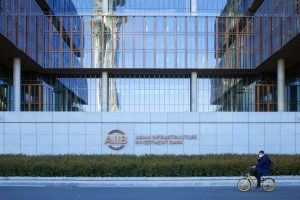The Asian Infrastructure Investment Bank (AIIB) recently announced it was willing to provide $5 billion in financing for a range of transport and renewable energy projects in Vietnam. The AIIB is a multilateral development bank headquartered in Beijing whose primary financial backer is China.
During a visit to Hanoi last month, AIIB President and Chairman of the Board Jin Liqun as quoted in the Hanoi Times, suggested these projects would include a “North-South high-speed railway, three railways connecting Vietnam to China, Central Asia, and Europe, and urban metro lines in Hanoi and Ho Chi Minh City.”
Vietnam has ambitious plans for upgrading its national infrastructure, and they will need external financing to pay for it all. If the $5 billion figure is realized, it would represent a substantial investment in Vietnam’s national infrastructure and a massive scaling up of the AIIB’s current financial ties in the country, which to date have totalled $233 million in relatively modest projects.
So what does this pledge actually mean? It’s basically a sign that the AIIB wants to be a key development partner and help Vietnam achieve its infrastructure goals. Until a more concrete investment plan materializes, however, the pledge remains mostly about signalling the AIIB’s intentions (and Vietnam signalling its receptiveness to the idea) but it doesn’t mean all that much in practical terms just yet.
The signal it sends is nevertheless important because it means the AIIB is willing and able to finance big infrastructure projects in Vietnam. Given some of the areas the AIIB intends to target, this announcement has other potential implications, particularly when it comes to the choices Vietnam has for financing major infrastructure projects.
For instance, Japan has been an active development partner in Vietnam for many years, financing the construction of the long-delayed Ho Chi Minh City Metro Line 1, as well as several airport expansions. Japan would likely be in the running for constructing any high-speed rail lines in the country, or further urban transit lines.
It’s therefore interesting that the AIIB is expressing interest in financing urban transit in Ho Chi Minh City and the North-South high-speed rail line under the $5 billion commitment, as these are areas where Japanese development finance has traditionally had significant influence or where we might expect it to play a significant role.
The AIIB’s intention to finance renewable energy is also noteworthy, given that it naturally draws comparisons with Vietnam’s Just Energy Transition Partnership, a $15.5 billion clean energy fund spearheaded by the United States, Japan and EU countries. The JETP is supposed to be split evenly between market rate and concessional rate financing, but the program has progressed slowly as the parties haggle over, among other things, the exact terms of financing. While the AIIB does not offer concessional loans to member countries, it does offer several financing options including sovereign-backed loans which Vietnam might find attractive if the JETP fails to gain traction or simply on its own terms.
The precise structure and details of AIIB’s investment in Vietnam will depend on the individual projects, their scope and feasibility. But the pledge itself underscores the extent to which rapidly growing economies in the region, like Vietnam, increasingly have choice and agency when it comes to who they partner with and how they finance and build infrastructure. This is something any development partner looking to expand its strategic footprint in the region should probably keep in mind.
The original version of this story erroneously stated that AIIB’s $5 billion pledge would be made at concessional rates. That was based on a mistranslation in a Vietnamese media report and has been corrected. The AIIB does not make concessional loans, and the amended version of this article provides additional information on the types of financing they do provide.
































